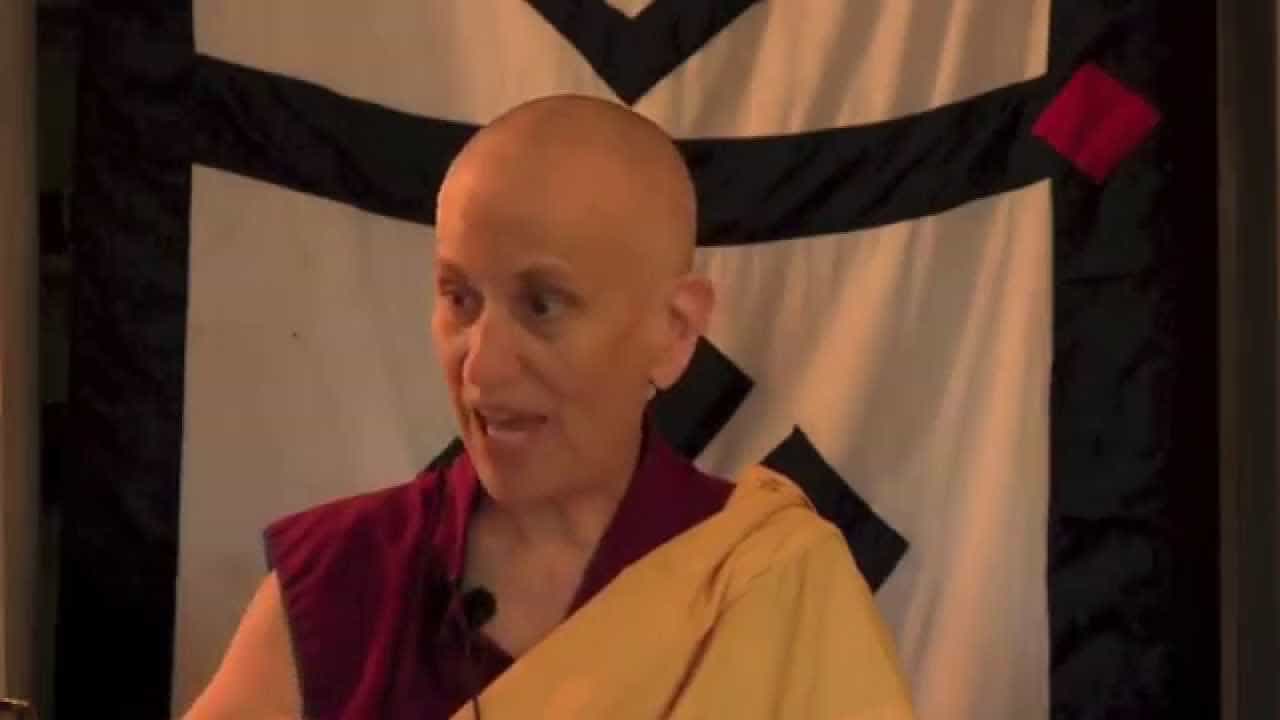Verse 28: Getting rid of body odor
Part of a series of talks on Gems of Wisdom, a poem by the Seventh Dalai Lama.
- Habits of social conditioning can make it hard to keep to our values
- Being challenged is part of the training
Gems of Wisdom: Verse 28 (download)
The Dalai Lama says, “What is the body odor easy to acquire but hard to lose?”
And the answer is not, “That which is gained from working in the forest.” [laughter] The answer is, “Habits picked up from people whose lives are far away from spiritual ways.”
What is the body odor easy to acquire but hard to lose?
Habits picked up from people whose lives are far away from spiritual ways.
We live in what is called a degenerate time. That’s kind of according to Buddhism. But if you look just ordinarily you would say the same thing, too. Very degenerate. We have some social structures that are biased and unfair. Our society is full of wrong philosophical views. And wrong views about all sorts of things that rationalize negative actions. And also culturally we’re subjected to the cultural norms of our society. In our case the norm of materialism, consumerism. So going back, the social structures that discriminate against people, that don’t allow equal opportunity. That completely regiment people into different categories that it’s difficult for them to escape from.
I was just reading this morning about we have so many children from Central America coming to the border. Especially there’s one city in Honduras where the neighborhood is totally gang infested. And so people want their kids to live longer than fourteen so they send their kids to the States. And what do we do? We want to beef up border security, instead of helping those countries remedy their social problems so that the families and children can be safe there.
These kind of social structures, political things that are going on; philosophical views where people think that the mind is the brain and so you just have to develop new drugs to solve social problems and cure people’s mental instability; or that things are genetically passed down. These can be really dangerous concepts, because then society starts to think that by watching somebody’s genes or somebody’s brain we can predict whether they’re going to be a criminal. Or whether they’re going to re-offend. And so then maybe we should arrest these people before they’ve done anything wrong in order to protect society.
And views that there’s no past and future lives so that when you die there’s absolutely nothing, so might as well live it up and as long as you don’t get caught there’s no problem with anything you do. And then cultural norms that we have: drinking, drugging, sex, everything just thinking about me and everything is about the self.
I like that thing—the selfies, you hold the camera out. You can even take a picture of yourself now. And then if you’re like some of the politicians you can sext it to other people. You know? It’s just incredible.
We find ourselves living in that kind of society. So this is the body odor that we pick up just by living in the midst of this, and we form social habits, or mental habits, or physical habits, based on the environment we grew up in. And some of these things we never even question because everybody around us believes.
I know when I went to Asia—lived in Asia—it was such a shock for me because people had many different cultural beliefs. And I really had to question things. Because I grew up, “Democracy is always the best thing for everybody at all times.” Well in Asia people don’t think like that. And when you look, sometimes a society has to have certain characteristics in order for democracy to work, otherwise democracy just totally unravels, and you slip beck into authoritarianism. Except sometimes it’s even worse than before. I won’t mention where that’s happening now, but I think you know.
I think Dharma really involves looking at all these kinds of preconceptions and assumptions that we grew up with due to our culture, our nationality, our religion…. Really questioning everything. I’m not a believer that Dharma is just one aspect of your life and you think you realize emptiness and then everything is cleared up. You’ve got to apply emptiness to everything else in your life. You’ve got to apply compassion to everything else in your life. Not just gain some kind of intellectual idea of them.
So, “habits picked up from people whose lives are far from spiritual ways.”
That’s kind of the environment we live in. In many ways it’s getting even moreso like that as years pass. In some ways, certain aspects are getting better. It’s hard to say. But in any case, as practitioners we’ve got to really understand the Dharma and be able to stand our ground.
Here’s where the “stand our ground” law is. Yes? Stand our ground for compassion! Stand our ground for wisdom. Stand our ground for forgiveness and generosity. And not just capitulate to societal norms. And I say this because people come in to the Abbey, we all have all of our conditioning, and I remember one time talking to a Catholic nun who was the novice master at her place, and she was saying that it’s very important when people come into the monastery not to let them re-create the environment that is familiar to them. Because somebody may have grown up in a family where discord and screaming are normal and they don’t feel comfortable in a place where people talk about problems and try and work them out. So that person may—without consciously knowing it, but just because of these habits—try to stir things up. So you’ve got to notice that and step in, and say this is what’s happening. And so to do this with all the kind of conditioning that people come in with. Some people come to the Abbey and they say, “Oh, well there’s nobody my age here. I want to be with people my age because my whole life I’ve grown up with people my age.” Because in our society, what do you do when you go to school? You’re put together with people your age. When you play sports it’s people your age. When you do competition it’s people your age. So you think, “I’ve always got to be around people my age.”
I remember that we had one young man here who was saying that, and so a few other young men came to stay at the Abbey, so then there were a few of them who were all the same age. And what did they talk about? Drugs, sex, TV programs, movies. Hmmm. You want to be with people your own aga? Hmmm. Why do you come to the monastery to talk about those things? [To audience] Do you remember that? And we had to kind of say, “Hey guys….” Because there was one person who was older sleeping in the dorm who said, “You should hear what they’re talking about down there…. Or maybe you shouldn’t hear what they’re talking about….”
These kind of habits that, “I’ve got to be with people who are just like me.” People the same age, people the same gender, people the same this, the same that. “I can’t live with people who are different from me. And yet I’m liberal and I accept everybody and have compassion for the world.” Right? But what are our personal preferences? People who are just like me. These kinds of habits that we come in with are things that we need to shine the light of wisdom on and then really challenge if we’re going to grow in the Dharma.
And that’s hard. And sometimes…. I mean you’re really challenged. You never even realized that it was an assumption or a belief because everybody was like that. And then it’s challenged here and you go, “Ahhh!” And some people get to the point where it’s too scary for them to begin to question certain things. And so their growth kind of stops at a certain point. So at least they grew as far as they could. But it’s nice if we’re aware beforehand that we’re going to be challenged. And then when the challenges come say, “Oh, this is part of the training, this is part of the monastic life. This is part of growing as a human being.” Whether you’re a monastic or not.
One of the Dalai Lamas said most ordinary people have their head facing backwards. So if you want to know how to practice, look at what they’re seeing and then see if maybe you want to do the opposite. [laughter]
And that’s exactly why in the 37 Practices of Bodhisattvas and in the Eight Verses of Thought Training so much of the advice is completely counter to what we ordinarily think. So it is good to bring these things up more and more and see them.
[In response to audience] Yes, you don’t realize what your body odor is because you’ve lived with it for so long. You can’t smell it anymore. [laughter]
Venerable Thubten Chodron
Venerable Chodron emphasizes the practical application of Buddha’s teachings in our daily lives and is especially skilled at explaining them in ways easily understood and practiced by Westerners. She is well known for her warm, humorous, and lucid teachings. She was ordained as a Buddhist nun in 1977 by Kyabje Ling Rinpoche in Dharamsala, India, and in 1986 she received bhikshuni (full) ordination in Taiwan. Read her full bio.


